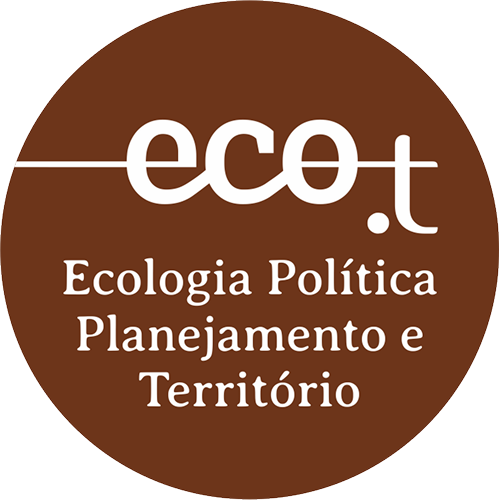The Research Group eco.t – Political Ecology, Planning, and Territory – aims to develop research and extension in the field of political ecology that analyzes the socio-environmental issues from a critical perspective on development, focusing on power relations and the production of inequalities. Its innovation lies in strengthening and expanding such reflection to the field of territorial planning, with the goal of understanding the processes leading to territorial injustices and proposing ways for their transformation. The group’s activities focus on producing critical research, publishing scientific papers, as well as popular mobilization, in addition to offering training courses and deepening the understanding of socio-environmental themes within the territorial context.
Theoretical reflections between territorial planning and political ecology
Explore and deepen the dialogue between Political Ecology and Territorial Planning. Recognizing that Political Ecology is a research agenda at its core, reflecting on how economic-political processes unequally transform the environment, it aligns with the practice of territorial planning based on relational, intersectoral reflection and the recognition of spatial relations present in the multiscalar and multidimensional aspects that constitute these spaces.
Analysis of territorial dynamics from socio-environmental relations
Analyze and reflect on territorial dynamics from the socio-environmental relations that constitute territories. The starting point of the analysis is the understanding that the environment results from relational interactions between humans and non-humans, mediated by economic-political processes. It will study how the environment is constituted, as a result of the production of territories, through the analysis of power flows, inequality, and reflective interactions.
Coordinating Professors:
- Vanessa Lucena Empinotti | eco.t Coordinator | Professor at BCH/BPT/PGT/UFABC | v.empinotti@ufabc.edu.br Lattes
- Luciana Nicolau Ferrara | Deputy Coordinator | Professor at BCH/BPT/PGT/UFABC and Researcher at the Favela Studies Center (Cefavela) | luciana.ferrara@ufabc.edu.br | Lattes
- Thais Tartalha do Nascimento Lombardi | Deputy Coordinator | Professor at BCH/BPT/PGT/UFABC, Vice-Coordinator of the Bachelor’s Degree in Sciences and Humanities and Assistant Editor of Progress in Development Studies | thais.tartalha@ufabc.edu.br | Lattes
Researchers:
- Amanda de Alencar Lopes | lopes.amanda@ufabc.edu.br | Lattes
- Bruno Avellar | bruno.avellar.lima@gmail.com | Lattes
- Ellen Emerich Carulli | emerich.carulli@gmail.com | Lattes
- Gabriel Alves da Silva Junior | gabriel.junior@ufabc.edu.br | Lattes
- Hugo Kamiya Tsutsui | hugo.kamiya@gmail.com | Lattes
- Ícaro Serra Chagas | icaro.chagas@ufabc.edu.br | Lattes
- Isadora Martins dos Santos | isadoramartinsantos@gmail.com | Lattes
- Julia Nascimento de Sá | juliadonascimentodesa@gmail.com | Lattes
- Karina Gonçalves de Almeida | k.almeida@ufabc.edu.br | Lattes
- Leticia Costa de Oliveira Santos | costa.leticia@ufabc.edu.br | Lattes
- Leonardo Varallo | leonardovarallo@gmail.com | Lattes
- Marcelo Aversa | m.aversa@uol.com.br | Lattes
- Marina Rago Moreira | marina.moreira@ufabc.edu.br | Lattes
- Paula Tomaz | alvestomazp@gmail.com | Lattes
- Raquel Henrique | kellhenrique@gmail.com | Lattes
- Renata Pereira Sarti | renata.sarti@aluno.ufabc.edu.br | Lattes
- Rodrigo José Paixão | Lattes
- Stéfany Ferreira de Lima | stefany.lima@aluno.ufabc.edu.br | Lattes
- Veridiana Emília Godoy | veridiana.e.godoy@gmail.com | Lattes
- Yohana Campos da Rocha | yohana.campos@aluno.ufabc.edu.br | Lattes
Foreign Collaborators:
projects

Environmental Justice in the Conservador das Águas Project: Perceptions and Challenges Among Rural Landowners in Extrema-MG
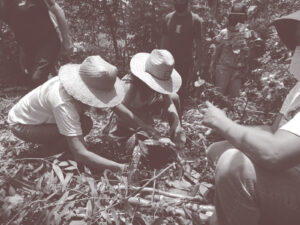 Researchers: Raquel Henrique (Supervision by Vanessa Empinotti)
Researchers: Raquel Henrique (Supervision by Vanessa Empinotti)
How the Conservador das Águas Project in Extrema-MG May Have Promoted Environmental Justice: Based on the different perceptions of the rural landowners involved, this research seeks to understand whether the project was able to ensure a fair distribution of benefits and active participation in decision-making processes. By exploring the priorities, values, and views of these participants, the study aims to identify how these diverse perspectives can make restoration practices more effective, aligned with local realities, and strengthen environmental sustainability and social justice in a deeper way.
Evaluation of Payment for Environmental Services (PES) in rural areas in the municipality of Extrema, Minas Gerais
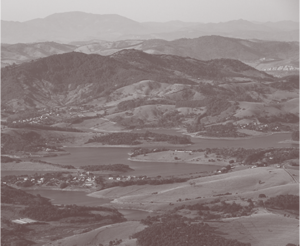 Researchers: Karina Gonçalves (Supervision by Vanessa Empinotti)
Researchers: Karina Gonçalves (Supervision by Vanessa Empinotti)
The aim of the research is to assess ecosystem services based on the Water Conservancy Project in Extrema, Minas Gerais, using the Toolkit for Ecosystem Service Site-based Assessment (TESSA) methodology.
Publications:
ALMEIDA, K. G. de. Pagamento por serviços ambientais como instrumento de planejamento ambiental. Anais do XXI Encontro Nacional da Associação Nacional de Pós-Graduação e Pesquisa em Planejamento Urbano e Regional (Sessão Temática). Campina Grande: Realize Editora, 2025. Disponível em: <https://editorarealize.com.br/artigo/visualizar/122984>.
Unequal transformations of urban socionature
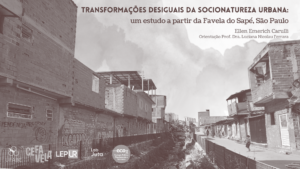 Researchers: Ellen Emerich Carulli (Supervision by Luciana Ferrara)
Researchers: Ellen Emerich Carulli (Supervision by Luciana Ferrara)
This study investigates the inequalities in socio-environmental transformations caused by public interventions along the Sapé Stream in the western zone of São Paulo between 2000 and 2023. The analysis focuses on the impacts of drainage and slum upgrading projects, comparing Favela do Sapé with surrounding areas. Using Urban Political Ecology, it examines who benefited and who was harmed, highlighting how power shapes the relationship between society and nature. The study shows that improvements were unevenly distributed, reinforcing inequalities. This research aims to foster debates and policies for fairer and more sustainable urban environments.
Publications:
SAMORA, Patrícia Rodrigues, Luz, Vera Santana, Silva, Jonathas Magalhães Pereira da, Afonso, Miguel Reis, Mantovani, Mariana Pereira, Ferrara, Luciana Nicolau, Carulli, Ellen Emerich, Denaldi Rosana, Moretti, Ricardo de Souza. TRANSFORMAÇÕES EM FAVELAS, SANEAMENTO E VULNERABILIDADE CLIMÁTICA: PERSPECTIVAS FRENTE AOS OBJETIVOS DO DESENVOLVIMENTO SUSTENTÁVEL.. In: Anais do Encontro Nacional da Associação de Pesquisa e Pós-Graduação em Arquitetura e Urbanismo: Encruzilhadas – convergências e dispersões. Anais…Rio de Janeiro(RJ) FAU/UFRj, 2024. Disponível em: https://www.even3.com.br/anais/enanparq8/848582-TRANSFORMACOES-EM-FAVELAS-SANEAMENTO-E-VULNERABILIDADE-CLIMATICA–PERSPECTIVAS-FRENTE-AOS-OBJETIVOS-DO-DESENVOLV. Acesso em: 18/02/2025
CARULLI, Ellen Emerich, Santos, Sabrina Oliveira, Ferrara, Luciana Nicolau, Pasqueto, Mariana Aparecida Ichikawa, Mariano, Enzo Calixto de Oliveira. DINÂMICA DE REMOÇÃO E REOCUPAÇÃO EM ÁREAS DE PRESERVAÇÃO PERMANENTE: DESAFIOS SOCIOAMBIENTAIS NA URBANIZAÇÃO DE FAVELAS.. In: Anais do Quarto URBfavelas: Seminário Internacional de Urbanização de Favelas. Anais…Sao Paulo(SP) USP, 2024. Disponível em: https://www.even3.com.br/anais/ivurbfavelas/903966-DINAMICA-DE-REMOCAO-E-REOCUPACAO-EM-AREAS-DE-PRESERVACAO-PERMANENTE–DESAFIOS-SOCIOAMBIENTAIS-NA-URBANIZACAO-DE-F. Acesso em: 18/02/2025
Gender relations in informal settlements with water insecurity: A feminist analysis in territorial planning
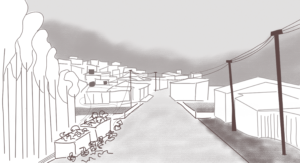 Researchers: Veridiana Godoy (Supervision by Vanessa Empinotti)
Researchers: Veridiana Godoy (Supervision by Vanessa Empinotti)
The objective of this dissertation is to analyze how the social construction of gender distributes responsibilities for water access practices in the context of precarious housing in urban spaces. The case study focuses on the Mangueirinha community, located in the far east of São Paulo, a precarious settlement that experiences diverse forms of water access, use, and management. To this end, the research is grounded in the theoretical and practical framework of Feminist Political Ecology and its contributions to territorial planning, deepening the socio-environmental issues of the right to water at less visible scales, such as the household and the body, interwoven with gender power relations.
Publications:
GODOY, Veridiana Emília; EMPINOTTI, Vanessa Lucena. “Só sou eu mesma que faço todo esse processo da água aqui”: A divisão por gênero das tarefas para conseguir água na comunidade Mangueirinha, Zona Leste de São Paulo. In: XXI Encontro Nacional da Associação Nacional de Pós-Graduação e Pesquisa em Planejamento Urbano e Regional, 2025, Curitiba, PR. Anais dos Trabalhos do XXI ENANPUR, 2025.
GODOY, Veridiana Emília; EMPINOTTI, Vanessa Lucena. Contributions of Feminist Political Ecology to the analysis of household water insecurity: the embodied experiences of the residents of the Mangueirinha community, São Paulo, SP, Brazil. In: POLLEN24 – Conferência da Political Ecology Network, Lima, Peru. 2024. Disponível em: https://cdn.brick.site/64876c6b2b18aca578ac0db0/original/Detailed-program-Lima.pdf
GODOY, Veridiana Emília. As relações de gênero em assentamentos precários diante da insegurança hídrica: uma análise feminista no planejamento territorial. Dissertação (mestrado) – Programa de Pós-Graduação em Planejamento e Gestão do Território. Universidade Federal do ABC. São Bernardo do Campo, 2023. Disponível em: http://biblioteca.ufabc.edu.br/index.php?codigo_sophia=127068
GODOY, Veridiana Emília; EMPINOTTI, Vanessa Lucena. O corpo como parte da infraestrutura: as experiências corporificadas de insegurança hídrica das moradoras da comunidade Mangueirinha, Zona Leste de São Paulo. In: Feminising urban struggles: bodies, territories and politics in the production of peripheral spaces, 2023, São Paulo. Abstracts Feminising urban struggles: bodies, territories and politics in the production of peripheral spaces, 2023. Disponível em: https://www.labcidade.fau.usp.br/wp-content/uploads/2023/11/Feminising-urban-struggles-seminar_proceedings_Final-Version.pdf
GODOY, Veridiana Emília; EMPINOTTI, Vanessa Lucena. A contribuição da Ecologia Política Feminista para o planejamento territorial: o debate da insegurança hídrica e gênero. In: XX Encontro Nacional da Associação Nacional de Pós-Graduação e Pesquisa em Planejamento Urbano e Regional, 2023, Belém, PA. Anais dos Trabalhos do XX ENANPUR, 2023. Disponível em: https://anpur.org.br/wp-content/uploads/2023/05/st12-01.pdf
Territorial Dynamics and Inequalities in the ABC - Sanitation Axis: Water and Housing in the ABC Region
 Researchers: Luciana Nicolau Ferrara, Vanessa Lucena Empinotti, Fernando Botton, Veridiana Emília Godoy, Vitor Hugo Alves dos Santos, Renata Pereira Sarti, Fernanda Donegá Martins, Daniela Zago, Paula Tomaz, Thiago Jacovini, Edson Aparecido Silva, Amauri Polachi
Researchers: Luciana Nicolau Ferrara, Vanessa Lucena Empinotti, Fernando Botton, Veridiana Emília Godoy, Vitor Hugo Alves dos Santos, Renata Pereira Sarti, Fernanda Donegá Martins, Daniela Zago, Paula Tomaz, Thiago Jacovini, Edson Aparecido Silva, Amauri Polachi
This research and extension project aimed to strengthen local-regional capacity for gathering and systematizing information on territorial dynamics in the Greater ABC Region, as well as for formulating and improving public policies and programs focused on reducing socio-spatial inequalities. The sanitation and water access axis aimed to identify, understand, and map the difficulties in accessing water in different forms of precarious housing in this region. The study was conducted in 8 precarious settlements located in the municipalities of Santo André, São Bernardo do Campo, Diadema, and Mauá, in collaboration with the movements and residents’ associations active in the four municipalities. The qualitative data collected via online questionnaires reflect and characterize the mapping of water scarcity in the precarious settlements, as well as the scale of water insecurity they are subjected to. The research results also contributed to strengthening the population’s struggle for access to clean water as a strategy for water security, in addition to supporting emergency and long-term public policies. The project was hosted by Lepur-UFABC in partnership with LabJuta – UFABC. Project website: https://aguaemoradia.pesquisa.ufabc.edu.br/
Mapping of water access in precarious housing during the Covid-19 pandemic
 Researchers: Luciana Nicolau Ferrara, Vanessa Lucena Empinotti, Ana Paula Pimentel Walker, Benedito Roberto Barbosa, Elton Aparecido Tavares Alves, Fernando Botton, Francisco de Assis Comarú, Gabriel Ancilotto Idu, Jade Vieira Cavalhieri, María Arquero de Alarcón, Marilene Ribeiro de Souza, Marcos Domingues, Rayssa Saidel Cortez, Sheila Cristiane Santos Nobre e Veridiana Emília Godoy
Researchers: Luciana Nicolau Ferrara, Vanessa Lucena Empinotti, Ana Paula Pimentel Walker, Benedito Roberto Barbosa, Elton Aparecido Tavares Alves, Fernando Botton, Francisco de Assis Comarú, Gabriel Ancilotto Idu, Jade Vieira Cavalhieri, María Arquero de Alarcón, Marilene Ribeiro de Souza, Marcos Domingues, Rayssa Saidel Cortez, Sheila Cristiane Santos Nobre e Veridiana Emília Godoy
The research and extension project aimed to identify, understand, and map the difficulties in accessing water in different forms of precarious housing during the Covid-19 pandemic. To achieve this, information was collected through an online questionnaire and in-depth interviews with residents of these areas, mainly in the municipality of São Paulo. The study observed issues related to the lack of infrastructure, as well as the intermittency of water supply and the difficulty in paying for this service. The combination of these factors demonstrated that the lack of water affects both those with access to the water network and those without access. Reports of the need to wake up in the middle of the night to store water and wash clothes were combined with the necessity of investing in a water collection and storage system that goes beyond the water tank to ensure that hygiene and food-related activities could be carried out. The problem of access to water is part of people’s daily lives and impacts how they organize their activities and their quality of life. This issue was exacerbated during the Covid-19 pandemic. These results contributed to strengthening the population’s struggle for access to clean water as a strategy for water security, as well as supporting emergency and long-term public policies. Project website: https://aguaemoradia.pesquisa.ufabc.edu.br/
Publications:
EMPINOTTI, V. L.; FERRARA, L. N. ; GODOY, V. E.; BOTTON, F. Para além da segurança-hídrica: insegurança hídrica em moradias precárias em tempo de pandemia. In: X Encontro Nacional da Anppas, 2021, Recife. Anais do X Encontro Nacional da Anppas. Campinas: Unicamp, 2021. v. 1. p. 1-17.
FERRARA, L.; EMPINOTTI, V.; VARGAS JR, G. ONDAS no FSM 2021: O direito à informação sobre o acesso à água e ao saneamento em tempos de COVID-19. ONDAS, 28 jan 2021. 1 vídeo (83 min). Disponível em: https://www.youtube.com/watch?v=f6_hV9gmt2U
CAVALHIERI, J. Papo #37: Cartografias do acesso à água na pandemia. Um papo sobre geotecnologia, 3 jun 2021. 1 vídeo (44min). Disponível em: https://www.youtube.com/watch?v=qjD_UEZbfFs&t=1s
SILVA, E. A.; FERRARA, L. N.; CORTEZ, R. S.; EMPINOTTI, V. L.; GHANI, Y. Direito à Água em tempos de pandemia da Covid-19, 2020. Disponível em: https://ondasbrasil.org/wp-content/uploads/2020/04/Direito-%C3%A0-%C3%A1gua-em-tempos-de-pandemia-da-COVID-19-Vers%C3%A3o-online.pdf
EMPINOTTI, V. L.; FERRARA, L. N. . Segurança Hídrica e a COVID-19 na Macrometrópole Paulista: da política do corpo ao território. Diálogos Socioambientais na Macrometrópole, v. 5, p. 13-14, maio 2020. Disponível em: https://pesquisa.ufabc.edu.br/macroamb/wp-content/uploads/2020/05/Di%C3%A1logos-Socioambientais_COVID-19-5.pdf
FERRARA, L.; BARBOSA, B.; CASTRO, L. Live do ONDAS: Moradia precária, falta d’ água e Covid-19. ONDAS, 06 maio 2020. 1 vídeo (66min). Disponível em: https://www.youtube.com/watch?v=WNQkyBpO90g
EMPINOTTI, VANESSA L.; CORTEZ, R. S. ; FERRARA, L. N. Coronavírus e Segurança Hídrica: é preciso acesso universal à água. Carta Capital, São Paulo, 10 abr. 2020.
MacroAmb: Environmental Governance of the São Paulo Macrometropolis in the Face of Climate Variability
 Researchers: Coordinated by Pedro Jacobi with the participation of eco.t Vanessa Empinotti, Leonardo Varallo, Marcelo Aversa and Rayssa Saidel Cortez
Researchers: Coordinated by Pedro Jacobi with the participation of eco.t Vanessa Empinotti, Leonardo Varallo, Marcelo Aversa and Rayssa Saidel Cortez
In a context heavily marked by global climate change, uncertainties, and strong trends in hydrological regime changes, it is necessary to advance knowledge and innovation in water management practices and environmental governance, with an emphasis on water vulnerability in the face of climate variability, from an integrated, decentralized, and interdependent perspective. The objective of this project is to analyze, in an interdisciplinary manner, the set of processes that should constitute an agenda of action and integration of the different interfaces of environmental governance associated with water and its various uses in the São Paulo Macrometropolis. Webpage: https://pesquisa.ufabc.edu.br/macroamb/
Publications:
CORTEZ, R. S.; EMPINOTTI, V. L. Segurança Hídrica em Paranapiacaba e o acesso à água para além da infraestrutura. In: Ruth Ferreira Ramos, Samia Nascimento Sulaiman, Silvia Helena Passarelli, Pedro Roberto Jacobi. (Org.). Paranapiacaba: Conflitos, Saberes e Perspectivas de Desenvolvimento na Macrometrópole Paulista. 1ed.Santo André: Editora UFABC, 2021, v. 1, p. 1-121.
EMPINOTTI, V. L.; TADEU, N. D.; FRAGKOU, M. C.; SINISGALLI, P. A. A. Desafios de governança da água: conceito de territórios hidrossociais e arranjos institucionais. ESTUDOS AVANÇADOS (ONLINE), v. 35, p. 177-192, 2021.
EMPINOTTI, V. L.; GIATTI, L. L.; SINISGALLI, P.; BERMANN, C. O Nexo Água?Energia?Alimento e os desafios da governança ambiental da Macrometrópole Paulista.. In: TORRES, P. H. C.; JACOBI, P. R.; BARBI, F.; GONÇALVES L.. (Org.). Governança e Planejamento Ambiental: adaptação e políticas públicas na Macrometrópole Paulista.. 1ed.Rio de Janeiro: Letra Capital, 2019, v. 1, p. 171-177.
FAVARETO, A.; EMPINOTTI, V. L. Agricultura, ruralidades e adaptação às mudanças climáticas na macrometrópole paulista. In: TORRES, P. H. C.; JACOBI, P. R.; BARBI, F.; GONÇALVES L.. (Org.). Governança e Planejamento Ambiental: adaptação e políticas públicas na Macrometrópole Paulista.. 1ed.Rio de Janeiro: Letra Capital, 2019, v. 1, p. 192-207.
JEPSON, W.; WUTICH, A.; EMPINOTTI, V. L.; JACOBI, P. R. Water insecurity and the state: failure, disconnection and autonomy. WATER INTERNATIONAL, v. 46, p. 779-782, 2021.
The Hydrosocial Cycle as an Analytical Tool: A Methodological Proposal and Application to Territorial Dynamics in the Triple Border Region (Mato Grosso do Sul - Paraná - São Paulo)
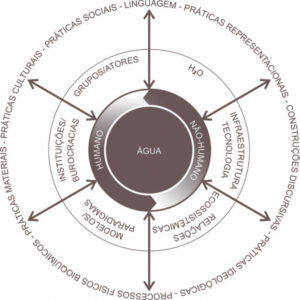 Rearchers: Hugo Kamiya Tsuitsui (Supervision by Vanessa Empinotti)
Rearchers: Hugo Kamiya Tsuitsui (Supervision by Vanessa Empinotti)
With the aim of analyzing the (re)configurations of territorial dynamics in the Triple Border region (MS-PR-SP), formed by the Paraná and Paranapanema rivers, based on water as the structuring element, this research appropriates the concept of the hydrosocial cycle to develop an analytical system for application in the case study. Its application, focusing on the actions of various social groups, the materiality of water, the implemented infrastructure, and ecosystemic relationships, allowed for the synthesis of a narrative of the main processes of reconfigurations that are closely intertwined in the production of water and territory.
Publications:
TSUTSUI, H. K.; EMPINOTTI, V. L. . O papel da água na atuação e reflexão do planejamento regional brasileiro: uma perspectiva histórica. REVISTA POLÍTICA E PLANEJAMENTO REGIONAL, v. 8, p. 121-139, 2021. http://www.revistappr.com.br/conteudo.php?m=NDE1&l=pt
TSUTSUI, H. K.; EMPINOTTI, V. L. . O papel da água nas dinâmicas territoriais: aplicação do sistema de análise do ciclo hidrossocial na tríplice fronteira (Mato Grosso do Sul-Paraná-São Paulo). In: PLURIS, 2021, Digital. Anais [recurso eletrônico] / do 9. Congresso LusoBrasileiro para o Planejamento Urbano, Regional, Integrado e Sustentável: pequenas cidades, grandes desafios, múltiplas oportunidades, Bauru, 07-09 abr. 2021, 2021.
TSUTSUI, H. K.; MACHIAVELLI, P. L. ; KERBER, L. . O ensino do Urbanismo e o modelo disciplinar: crítica e reflexão para uma nova agenda. REVISTA POLÍTICAS PÚBLICAS & CIDADES, v. 7, p. 179-194, 2018. https://rppc.emnuvens.com.br/RPPC/article/view/235/170
TSUTSUI, H. K. (2019) O Ciclo Hidrossocial como Ferramenta de Análise: Uma Proposta Metodológica e Aplicação às Dinâmicas Territoriais da Tríplice Fronteira (Mato Grosso do Sul – Paraná – São Paulo). Dissertação (Mestrado) — Universidade Federal do ABC, Planejamento e Gestão do Território, São Bernardo do Campo.
Resilience and Water Security in Times of Climate Change: A Study of the Metropolitan Regions of Campina Grande and São Paulo, the Challenge of Promoting Greater Transparency and Strengthening Collaborative Practices
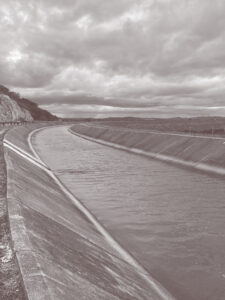 Researchers: Coordination by Pedro Jacobi and José Irivaldo Alves Oliveira Silva with the participation of eco.t Vanessa Empinotti
Researchers: Coordination by Pedro Jacobi and José Irivaldo Alves Oliveira Silva with the participation of eco.t Vanessa Empinotti
This project is based on the contextualization of the water realities in two regions, Médio Paraíba and Alto Tietê, located in the states of Paraíba and São Paulo, respectively, which are increasingly affected by water scarcity, with their specificities related to water security. The project assumes adaptive governance and sustainability to prioritize the development and application of social technologies. These technologies promote empowerment and dialogue with different segments of society in the face of climate change in urban and peri-urban contexts. Therefore, the central objective of the project is, on the one hand, to investigate and analyze practices and plans, and on the other, to develop and propose guidelines and action plans for adaptive Water Security, which includes technical, participatory, and sustainability dimensions as pillars in the formulation of a water governance dynamic in the context of climate change. The project will discuss guidelines for the actions of multiple stakeholders in the selected river basins in the involved states. The research will be based on participatory methodologies centered on documentary and bibliometric research, semi-structured interviews, and a social learning approach, aiming to establish a research network around these two regions, as well as a dialogue between teams and partners concerning the river basins that are vital for public water supply.
Household Water Insecurity and Environmental Degradation in Areas Susceptible to Desertification: Vulnerabilities and Perspectives in the Ceará Semi-Arid Region
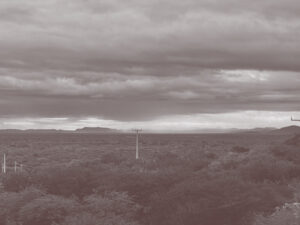 Researchers: Coordination by Jader de Oliveira Santos with the participation of eco.t Vanessa Empinotti
Researchers: Coordination by Jader de Oliveira Santos with the participation of eco.t Vanessa Empinotti
The discussion on climate change aptly highlights how the relationships between society and nature develop across various scales. Serious socio-environmental issues with adverse effects on the economy and environments with lower carrying capacities have intensified globally, and, concerningly, they impact the most vulnerable populations. It is within this context that the Brazilian semi-arid region is situated, where the historical exploitation of natural resources underpins the origins of socio-environmental problems, compromising both the fulfillment of basic survival needs and the expansion of economic development. This proposal integrates a set of coordinated social technology actions aimed at contributing to the reduction of poverty and socio-environmental degradation, improving the quality of life of communities in areas susceptible to desertification. The proposal’s priority focus is on fostering collaboration among researchers and research groups in investigative practices aimed at understanding environmental degradation and water vulnerability. Additionally, it promotes the integration of actions designed to enhance water and energy security for vulnerable communities, guided by the Sustainable Development Goals (SDGs), particularly Goals I, II, III, IV, V, VI, and VII. To achieve this, the proposal includes conducting community-level analyses and diagnostics using participatory methodologies; carrying out technical-scientific studies considering the potential and weaknesses of environmental systems and social groups; assessing water vulnerability; implementing low-cost technological interventions to reduce water and energy insecurity; establishing a community-based environmental monitoring system; and proposing educational actions and the dissemination of scientific knowledge, focusing on areas susceptible to desertification.

The Use of Climate Change Mitigation Instruments at the Municipal Level: An Analysis of the Conservador das Águas and Extrema in Climate Initiatives
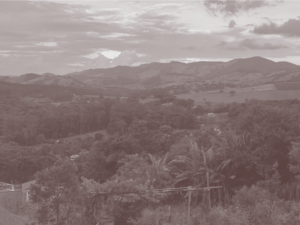 Researchers: Stéfany Ferreira de Lima (Supervision by Vanessa Empinotti)
Researchers: Stéfany Ferreira de Lima (Supervision by Vanessa Empinotti)
Allan Razera
The research aims to analyze the relationship between Payments for Environmental Services (PES) and the carbon market as instruments for climate change mitigation at the municipal level, using the Extrema in Climate Program (PEC) as a case study and its articulation with the Conservador das Águas Project (PCA).
Territorial Configurations and Deforestation in the Amazon: Contributions to the Interpretation of Recent Dynamics in Agribusiness Expansion Areas
 Researchers: Allan Razera
Researchers: Allan Razera
Based on critical reflections on the historical processes of occupation and deforestation in the Amazon, as well as debates related to the causes of deforestation, the thesis makes an effort to characterize and incorporate aspects of social structure and territorial dynamics. These aspects are examined in the context of broader processes of territory formation and how access to resources, the relationship between rural and urban areas, productive structure, access to markets, and other fundamental dimensions that shape processes and social relations are addressed within them.
Publications:
RAZERA, A. Dinâmicas Recentes e Causas do Desmatamento da Amazônia: Caminhos para uma Abordagem Territorial. In: IX Encontro Nacional da Associação Nacional de Pós-graduação e Pesquisa em Ambiente e Sociedade – ENANPPAS, 2019, Brasília – DF.
RAZERA, A; FAVARETO, A. Reflexões sobre o Futuro da Amazônia a partir de uma Proposta de Periodização do Desmatamento. In: X Encontro Nacional da Associação Nacional de Pós-graduação e Pesquisa em Ambiente e Sociedade – ENANPPAS, 2021, Campinas – SP.
Sociobiodiverse Territories in Maranhão and Pará: Environment, Knowledge, and Sustainability
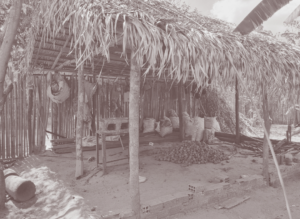 Researchers: Emília Pietrafesa de Godoi, Thais Tartalha do Nascimento Lombardi, Verena Sevá Nogueira, Thiago Romeu de Souza, Diego Amoedo Martínez, Benedito de Souza Filho
Researchers: Emília Pietrafesa de Godoi, Thais Tartalha do Nascimento Lombardi, Verena Sevá Nogueira, Thiago Romeu de Souza, Diego Amoedo Martínez, Benedito de Souza Filho
The soybean production chain and livestock farming have caused pressures and threats to the preservation of forests and the traditional populations that depend on them for their livelihoods. The knowledge and practices that are capable of creating and maintaining sociobiodiversity and valuing it need to be studied in order to understand the role of the ways of relating to biodiversity developed by these populations over time, which enable their preservation. To this end, an interdisciplinary approach is proposed, involving various fields of scientific knowledge, as well as a collaborative approach between distinct knowledge systems (traditional knowledge, such as that of quilombola communities and other traditional communities, and academic knowledge). This approach also aims to contribute to ecosystem restoration and income generation for local communities. The empirical sites for this research are communities from the Chapada das Mesas National Park (MA) and the RAMSAR Site Baixada Maranhense, as well as communities located in the Baixo Tapajós, near or within the Tapajós National Forest (PA).

Public policies on gender and territoriality: comparative analysis in urban and rural contexts in the state of Sergipe
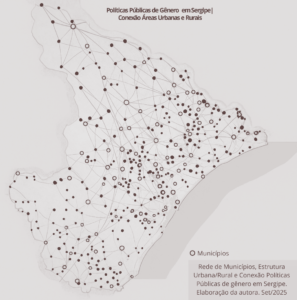 Researchers: Amanda de Alencar Lopes (Supervision by Vanessa Empinotti)
Researchers: Amanda de Alencar Lopes (Supervision by Vanessa Empinotti)
The research aims to analyze the incidence and articulation of gender-related public policies aimed at women in different territorial contexts—urban and rural—in municipalities in the state of Sergipe. The study seeks to identify how gender-related public policies aimed at women impact each context, investigating the extent to which such policies are more isolated or less articulated in rural contexts, and identifying the factors that contribute to these differences. By highlighting the importance of territorial planning as a political and situated field, the research emphasizes the need to incorporate a gender perspective into the development of public policies that recognize territorial and social diversity, promoting greater equity and social justice.
Development-Induced Displacements and Women and Children Wellbeing
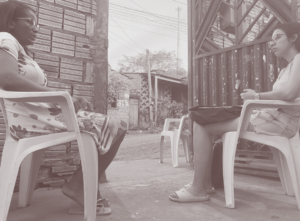 Researchers: Coordenation by Heather Randell and the eco.t teacher Thais Tartalha
Researchers: Coordenation by Heather Randell and the eco.t teacher Thais Tartalha
This project examines the dynamics between development-induced displacement and resettlement (DIDR) and the health and well-being of women and children. The project is designed as a longitudinal study, consisting of a pre-displacement household survey complemented by a second round of in-depth interviews in this new phase of the research. The objectives are: (1) to understand how women and children have experienced and responded to DIDR, with a focus on child well-being and reproductive, maternal and child health; (2) and to identify the mechanisms that link the relationship between DIDR and women’s and children’s well-being.
Publications:
LOMBARDI, T. T. N.; RANDELL, H.; BARBOSA, S. C. G.; SILVA, M. A. A. e; SILVA, S. A. M.; SARTI, R.; TEMOTEO, T. C.; KLEIN, P.; MOURA, A. L.; MOURA, J. da S. Deslocamentos compulsórios, grandes obras e bem estar: Contribuições para políticas públicas. Informativo para a prática – eco.t, n. 1. 2025. Disponível em: <https://drive.google.com/file/d/12Ys7ty_H_hPHKaTyZCUJydoKD_8bmtNm/view>.
Rural gentrification: Literature review and analysis of the transformations un the occupation dynamics of Extrema – MG
 Researchers: Renata Pereira Sarti (Supervision by Vanessa Empinotti and co-supervision by Thais Tartalha)
Researchers: Renata Pereira Sarti (Supervision by Vanessa Empinotti and co-supervision by Thais Tartalha)
Gentrification is a complex process that was originally studied in urban areas, aiming to understand how economic and social changes affect the real estate market. In the case of Extrema, the goal is to analyze how this phenomenon manifests in rural areas. The idea is to create an analytical framework that helps to understand the changes in the territory and apply key indicators to identify the gentrification process, as well as study the transformations it causes in the region.
Payment for Environmental Services and its local consequences: an analysis of the effectiveness of the tool for environmental conservation and the well-being of the local population
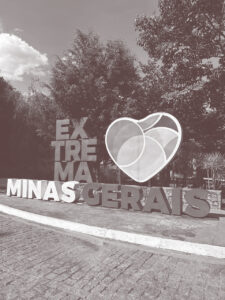 Researchers: Yohana Campos da Rocha (Supervision by Thais Tartalha do Nascimento Lombardi)
Researchers: Yohana Campos da Rocha (Supervision by Thais Tartalha do Nascimento Lombardi)
The relationship between the environment and human well-being is central to debates on sustainability and territorial development. This project studies Payment for Environmental Services programs and their potential for both conservation and well-being. Payment for Environmental Services programs are policies that encourage environmental protection through financial incentives, usually applied in rural areas. The study also analyzes the contemporary concept of rurality, considering transformations in landscapes and territorial dynamics. Environmental indicators, such as vegetation cover and rural sanitation, and socioeconomic aspects, such as income generation and quality of life, will be assessed, contributing to the understanding of Payment for Environmental Services impacts.
The instruments of environmental planning and territorial management as spaces for articulation and participatory social control in the environmental licensing process of the Thermal Power Plant in the municipality of Caçapava, State of São Paulo
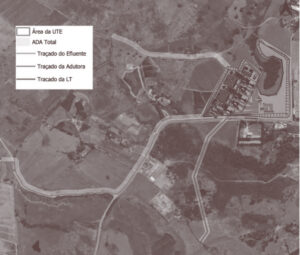 Researchers: Gabriel Alves da Silva Júnior (Supervision by Vanessa Empinotti)
Researchers: Gabriel Alves da Silva Júnior (Supervision by Vanessa Empinotti)
In this academic work, through the conceptual approach of the evolution of environmental justice, we will seek to analyze the model of current planning and territorial management instruments, in light of the Federal Constitution, and other normative devices such as the Statutes of the City and the Metropolis. Thus, we will seek to analyze how the spaces of articulation and participatory social control of civil society and social movements, the impasses in governance through conflicts and asymmetries of power, according to principles of environmental justice and participatory and deliberative democracy in the licensing process of the thermoelectric plant in the municipality of Caçapava/SP.
Publications:
JÚNIOR, G. A. da S. Ecologia politicas, territórios e justiça ambiental. (sessão temática 6). Anais do XXI Encontro Nacional da Associação Nacional de Pós-Graduação e Pesquisa em Planejamento Urbano e Regional (Sessão Temática). Campina Grande: Realize Editora, 2025. Disponível em: <https://editorarealize.com.br/artigo/visualizar/123010>.
Territorialization of Care in the Gera Juncal Community Garden
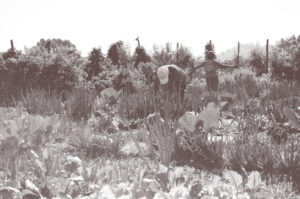 Researchers: Leticia Costa de Oliveira Santos (Supervision by Vanessa Empinotti)
Researchers: Leticia Costa de Oliveira Santos (Supervision by Vanessa Empinotti)
This doctoral research investigates the formation of territorialities based on relationships of care. I observe the Gera Juncal Community Garden, created by a popular movement in the East Zone of São Paulo, and trace the garden’s trajectory within the wider context of the struggle for food sovereignty, housing, urban agroecology and the right to the city. Engaging with the literature of critical studies of science and technology and political ecologies on the commons and care, I observe the continuous formation of a political-ecological community that is shaped and redesigned through negotiations of care in everyday life, strategies of struggle, conflicts and refusals, concretizing the elaboration of ways of inhabiting the city.
Publications:
SANTOS, L. C. de O. Sobre viver e lutar pela soberania alimentar em São Paulo. Diálogos Socioambientais, [s. l.], v. 7, n. 20, p. 43–47, 2024.
(Eco) feminist practices and debates on territories in Latin America: Contributions to Territorial Planning
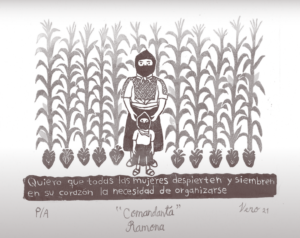 Researchers: Marina Rago Moreira (Supervision by Vanessa Empinotti)
Researchers: Marina Rago Moreira (Supervision by Vanessa Empinotti)
In the 21st century, we see various popular feminist collectives and movements advocating for the defense of their territories, with proposals such as agroecology, solidarity economy, food sovereignty, and Buen Vivir. The research investigated how these Latin American (eco)territorial feminisms, over the last decade, redefine territory and what perspectives emerge. It sought to contribute to territorial planning by presenting these concepts and proposals to address the global ecological crisis and reduce social inequalities.
Publications:
MOREIRA, Marina Rago; GODOY, V. E. ; EMPINOTTI, Vanessa Lucena . A LUTA DAS MULHERES NO CAMPO A PARTIR DA ECOLOGIA POLÍTICA FEMINISTA (EPF) E DOS ECOFEMINISMOS NA AMÉRICA LATINA. In: X Encontro Nacional da Anppas, 2022, Campinas. Anais do X Encontro Nacional da Anppas. Campinas: Even3, Unicamp, 2021.
MOREIRA, Marina Rago; EMPINOTTI, Vanessa Lucena. Território e feminismos na América Latina. In: Anais do XX ENANPUR, Belém: UFPA, 2023.
Challenges for the Consolidation of a Commons: The Case of Fazenda Cachoeira, Vinhedo-SP-Brazil
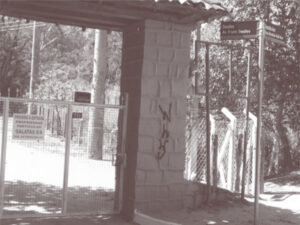 Researchers: Rodrigo José Paixão (Supervision by Vanessa Empinotti)
Researchers: Rodrigo José Paixão (Supervision by Vanessa Empinotti)
The notorious effects of neoliberal policies have contributed to the emergence of significant theoretical and practical reflections on the “commons” in political and academic environments. The great relevance of goods, services, rights, and ecosystems of collective interest, which have been subject to exploitation and enclosure in recent decades, in addition to the expansion of ongoing social and territorial inequalities, justifies the prominence of the debate on the “commons.” This master’s project focused on the challenges of forming and consolidating the commons in cities, in light of the socio-political dynamics expressed in socially recognized property regimes. The research begins with the analysis and case study of a portion of the territory in the municipality of Vinhedo-SP, aiming to understand how the commons are constituted and which factors and variables work against this process. The proposed empirical object, Fazenda Cachoeira, is a territory with characteristics of an unconsolidated common (semi-common), historically formed in a hybrid space, being a private property with public areas and listed heritage sites within its boundaries. By studying how this area can be consolidated as a common, the aim is to understand its relationship with property regimes and the challenges for this objective to be realized.
Publications:
PAIXÃO, Rodrigo José. DESAFIOS PARA A CONSOLIDAÇÃO DE UM COMUM: o caso da Fazenda Cachoeira, Vinhedo-SP-Brasil. Mestrado em Planejamento e Gestão do Território – Universidade Federal do ABC, São Bernardo do Campo – SP, 2020.
Land Uses and Preservation of Urban Riverbanks in Brazil: Challenges for Territorial Planning
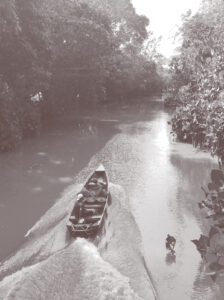 Researchers: Renata Cristina Ferreira
Researchers: Renata Cristina Ferreira
There is tension in the application of the Brazilian Forest Code in urban rivers because the legislation established at the federal level, when it reaches specific places, adapts and conforms to local realities, interests, and arrangements, not guaranteeing their preservation. This thesis aims to analyze the main conflicts found in Brazilian urban rivers and understand the most relevant interfaces between them and the legislation. To comprehend the territorial determinants, the diversity of Brazilian urban rivers, the various city scales found in the country, and the peculiarities of the places, we prioritize the concept of geographical situation.
Publications:
FERREIRA, R. C. ; GALLO, F. Política e Gestão Ambiental para a Preservação das Margens dos Rios Urbanos na América Latina: Experiências da Colômbia e do Brasil. In: VIVIAN URQUIDI; MARGARIDA NEPOMUCENO; MAYRA COAN LAGO; JOANA DE FÁTIMA RODRIGUES; RITA DE CÁSSIA MARQUES LIMA DE CASTRO; SABRINA RODRIGUES. (Org.). Estado e lutas sociais na América Latina: sociedade, economia e política. 1ed.São Paulo: PROLAM/USP, 2019, v. 3, p. 1156-1166.
FERREIRA, R. C. ; MAIA, D. C. ; GALLO, F. . O papel das Áreas de Preservação Permanente Urbanas na dinâmica das cidades contemporâneas brasileiras: uma reflexão sobre a perspectiva da ecologia política. In: XIII ENANPEGE – Encontro Nacional da ANPEGE, 2019, São Paulo. Anais do XIII ENANPEGE – Encontro Nacional da ANPEGE, 2019.
FERREIRA, R. C. A Elaboração de Estudos Técnicos Ambientais para a Regularização Fundiária de Interesse Social: Experiências em Área de Preservação Permanente Urbana na RMSP. In: II CONGRESSO BRASILEIRO DE ORGANIZAÇÃO DO ESPAÇO, 2019, Rio Claro

From the body-territory to the “cidade-armário”: notes about LGBTQIA+ territorialities in the city of Santos (SP)
 Researchers: Ícaro Serra Chagas (Supervision by Thais Tartalha do Nascimento Lombardi)
Researchers: Ícaro Serra Chagas (Supervision by Thais Tartalha do Nascimento Lombardi)
This research has the general objective of understanding and mapping contemporary LGBTQIA+ territorialities in the city of Santos, analyzing them intersectionally in their processes of integration (or not) into the aforementioned urban space based on the territorial actions of LGBTQIA+ bodies. Methodologically, in order to ensure the understanding of the territorialities in question through the interlocutors, the qualitative data collection and analysis tools will be articulated based on ethnographic field research. Finally, the aim is to construct a queer cartography of the city of Santos.
Nature in the production of urban space: socio-environmental risks and conflicts in the outskirts of São Paulo
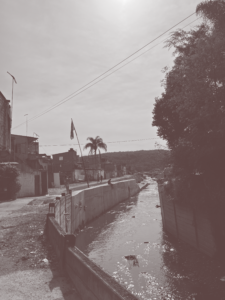 Researchers: Júlia do Nascimento de Sá (Supervision by Luciana Ferrara)
Researchers: Júlia do Nascimento de Sá (Supervision by Luciana Ferrara)
This master’s research aims to analyze the socio-environmental conflicts related to the works of the Growth Acceleration Program (PAC), known as PAC Drenagem Aricanduva, especially in the periphery of the East Zone of São Paulo. The study seeks to understand how space and nature have been produced and appropriated, as well as the impacts on people’s relationships with nature, conceptualized as urban metabolism, and how they are linked to local risks. To achieve this, a literature review of authors from Political Economy and Political Ecology was conducted, along with document analysis and fieldwork with participant observation in favelas in the region.
Publications:
SÁ, J. N. A narrativa do risco socioambiental nas intervenções do PAC Drenagem Aricanduva. In: XX Encontro Nacional da Associação Nacional de Pós-Graduação e Pesquisa em Planejamento Urbano e Regional (ENANPUR), 2023, Belém. Anais do XX ENANPUR, 2023. p. 1-21.
SÁ, J. N.; FERRARA, L. N. A dimensão da natureza na urbanização contemporânea: Os processos de capitalização e aumento das desigualdades. 2024. (Apresentação de Trabalho/Seminário). IN: LASA2024 Hybrid Congress: Reacción y resistencia: Imaginar futuros posibles en las Américas. Anais do LASA, 2024.
SÁ, J. N; FERRARA, Luciana. Conflictos e contradicoes na producao do espaco e da natureza no urbano: territorios populares afetados pelo PAC drenagem. In: VI Seminario Internacional Las ciudades latinoamericanas en la coyuntura actual Los desafíos de las teorías críticas. Universidad Autonoma Metropolitana, Ciudad de México, No prelo.
Subsumption of nature and new forms of capitalization under the real estate-financial metabolism in the city of São Paulo in the 21st century
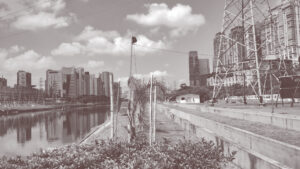 Researchers: Bruno Avellar Alves de Lima
Researchers: Bruno Avellar Alves de Lima
The postdoctoral project aims to discuss the contemporary logics of production of space and nature imposed by the real estate-financial metabolism in the city of São Paulo. The hypothesis is that, given the contemporary metabolic dynamics, guided by the real estate-financial sector, it is possible to observe complex combinations between the formal subsumption and the real subsumption of nature in the city of São Paulo. We hope that this research will contribute to contemporary debates on the confluences between the capitalization of nature, land and real estate under the financial domain.
Publications:
LIMA, Bruno A. A. Contradições da cidade compacta: Reflexões críticas a partir das lógicas contemporâneas de produção do espaço em São Paulo. Revista Pos FAUUSP. São Paulo, v. 31, n. 58, 2024.
LIMA, Bruno A. A. Contradictions of the compact city: Critical reflections from the contemporary logics of space production in São Paulo. Revista Pos FAUUSP. São Paulo, v. 31, n. 58, 2024.
LIMA, Bruno A. A. Subsunção formal e real da natureza na produção imobiliária e as transformações metabólicas diante da financeirização: fundamentos teóricos para um debate. In: FERRARA, L. N.; HIDALGO, R.; LIMA, B. A. A. (Orgs.). Natureza e metabolismo urbano: reestruturação do espaço no Brasil e no Chile. Rio de Janeiro, Letra Capital, p. 99-118, 2023.
RUFINO, Beatriz; LIMA, Bruno A. A.. O metabolismo da cidade compacta na metamorfose urbana: A produção imobiliário-financeira nos eixos de adensamento em São Paulo. In: FERRARA, L. N.; HIDALGO, R.; LIMA, B. A. A. (Orgs.). Natureza e metabolismo urbano: reestruturação do espaço no Brasil e no Chile. Rio de Janeiro, Letra Capital, 2023.
FERRARA, Luciana N.; ALDIGUERI, Camila; LIMA, Bruno A. A.; HOLANDA, Thayná L. C. Formas de capitalização da natureza em empreendimentos imobiliários nas Operações Urbanas Consorciadas Faria Lima e Agua Espraiada no Município de São Paulo. In: FERRARA, L. N.; HIDALGO, R.; LIMA, B. A. A. (Orgs.). Natureza e metabolismo urbano: reestruturação do espaço no Brasil e no Chile. Rio de Janeiro, Letra Capital, p. 209-242, 2023.
LIMA, Bruno A. A. “Viva em um parque”: Da negação da apropriação coletiva da natureza à sua produção privada em empreendimentos imobiliários em São Paulo. In: Anais do XX ENANPUR. UFPR, Belém, Pará, 2023.
LIMA, Bruno A. A. Imobiliário, sustentabilidade e finanças: A difusão da agenda ESG pela Associação Brasileira de Incorporadoras Imobiliárias (ABRAINC) no contexto da financeirização. Anais do XVIII SIMPURB. UFF, Niterói, Rio de Janeiro, 2024.
LIMA, Bruno A. A.; FERRARA, Luciana N.; RUFINO, B. A agenda ESG e as novas estratégias de capitalização na produção imobiliária. Anais do XXI ENANPUR. UFPR, Curitiba, Paraná, 2025.
Nature and Urban Metabolism in the Restructuring of Space in Brazil and Chile
 Researchers: Luciana Nicolau Ferrara, Rodrigo Hidalgo Dattwyler e Bruno Avellar Alves de Lima
Researchers: Luciana Nicolau Ferrara, Rodrigo Hidalgo Dattwyler e Bruno Avellar Alves de Lima
The project aimed to understand and analyze the process of real estate restructuring that Brazilian and Chilean cities have undergone, emphasizing the ways in which nature is appropriated for new real estate products. This was investigated through selected developments and urban fragments, capable of illustrating the process. The mentioned processes present exceptional characteristics in both countries, which can be described and analyzed through common theoretical categories and concepts. The hypothesis formulated is that real estate restructuring has altered the use and exploitation of nature, playing a key role in the transformation of urban metabolism, which is based on the flows of energy and investments that drive cities to expand both horizontally and vertically. The issue of urban metabolism and the production of nature emerge as central themes in the context of financial capitalism.
Publications:
FERRARA, L. N.; DATTWYLER, R. H.; LIMA, B. A. A. Natureza e metabolismo urbano: reestruturação do espaço no Brasil e no Chile. 1. ed. – Rio de Janeiro: Letra Capital, 2023. DOI: 10.56257/lcbk.978-85-7785-892-7. Disponível em: https://lepur.com.br/wp-content/uploads/2024/10/ERRATA_PDF_Natureza-e-metabolismo-urbano_Naturaleza-y-metabolismo-urbano.pdf
library
Articles (in journals and at events)
JÚNIOR, G. A. da S. Ecologia politicas, territórios e justiça ambiental. (sessão temática 6). Anais do XXI Encontro Nacional da Associação Nacional de Pós-Graduação e Pesquisa em Planejamento Urbano e Regional (Sessão Temática). Campina Grande: Realize Editora, 2025. Disponível em: <https://editorarealize.com.br/artigo/visualizar/123010>.
ALMEIDA, K. G. de. Pagamento por serviços ambientais como instrumento de planejamento ambiental. Anais do XXI Encontro Nacional da Associação Nacional de Pós-Graduação e Pesquisa em Planejamento Urbano e Regional (Sessão Temática). Campina Grande: Realize Editora, 2025. Disponível em: <https://editorarealize.com.br/artigo/visualizar/122984>.
CARULLI, E. E.; SÁ, J. N.; FRUTUOSO, B.; MATOS, G. S.; ALVES, E. M. Revelando as intervenções em Áreas de Preservação Permanente no município de São Paulo: uma revisão bibliográfica sistemática e documental. In: XXI ENANPUR – Encontro Nacional da Associação Nacional de Pós-Graduação e Pesquisa em Planejamento Urbano e Regional. Anais do XXI ENANPUR, 2025.
GODOY, V. E.; EMPINOTTI, V. L. “Só sou eu mesma que faço todo esse processo da água aqui”: A divisão por gênero das tarefas para conseguir água na comunidade Mangueirinha, Zona Leste de São Paulo. In: XXI Encontro Nacional da Associação Nacional de Pós-Graduação e Pesquisa em Planejamento Urbano e Regional, 2025, Curitiba, PR. Anais dos Trabalhos do XXI ENANPUR, 2025.
LIMA, B. A. A.; FERRARA, L. N.; RUFINO, B. A agenda ESG e as novas estratégias de capitalização na produção imobiliária. Anais do XXI ENANPUR. UFPR, Curitiba, Paraná, 2025.
RETAMERO, H. B.; PINZAN, M. D.; XAVIER, J. B.; GODOY, V. E.; GIGLIO, G. Lei de ATHIS e sua prática enquanto reivindicação de política pública. In: XXI Encontro Nacional da Associação Nacional de Pós-Graduação e Pesquisa em Planejamento Urbano e Regional, 2025, Curitiba, PR. Anais dos Trabalhos do XXI ENANPUR, 2025.
SÁ, J. N.; GIGLIO, G.; RETAMERO, H. B.; XAVIER, J. B.; GODOY, V. E. O Montanhão fica: O processo de construção do Plano Popular Caminhos do Cafezal. In: XXI Encontro Nacional da Associação Nacional de Pós-Graduação e Pesquisa em Planejamento Urbano e Regional, 2025, Curitiba, PR. Anais dos Trabalhos do XXI ENANPUR, 2025.
EMPINOTTI, V. L.; GARJULLI, R. MAD and its challenges for water governance: Reflections on the Brazilian reality. Water Security, v. 21, p. 100159, 2024.
FERRARA, L. N.; CARULLI, E. E.; SANTOS, S. O. INFRAESTRUTURA INCOMPLETA E DESIGUALDADES AMBIENTAIS NA FAVELA: DRENAGEM E RISCO DE ALAGAMENTO. In: Anais do Encontro Nacional da Associação de Pesquisa e Pós-Graduação em Arquitetura e Urbanismo: Encruzilhadas – convergências e dispersões. Anais…Rio de Janeiro(RJ) FAU/UFRj, 2024. Disponível em: https://www.even3.com.br/anais/enanparq8/851379-INFRAESTRUTURA-INCOMPLETA-E-DESIGUALDADES-AMBIENTAIS-NA-FAVELA–DRENAGEM-E-RISCO-DE-ALAGAMENTO. Acesso em: 18/02/2025
LIMA, B. A. A. Contradições da cidade compacta: Reflexões críticas a partir das lógicas contemporâneas de produção do espaço em São Paulo. Revista Pos FAUUSP. São Paulo, v. 31, n. 58, 2024.
LIMA, B. A. A. Contradictions of the compact city: Critical reflections from the contemporary logics of space production in São Paulo. Revista Pos FAUUSP. São Paulo, v. 31, n. 58, 2024.
LIMA, B. A. A. Imobiliário, sustentabilidade e finanças: A difusão da agenda ESG pela Associação Brasileira de Incorporadoras Imobiliárias (ABRAINC) no contexto da financeirização. Anais do XVIII SIMPURB. UFF, Niterói, Rio de Janeiro, 2024.
SÁ, J. N.; FERRARA, L. N. A dimensão da natureza na urbanização contemporânea: Os processos de capitalização e aumento das desigualdades. 2024. IN: LASA2024 Hybrid Congress: Reacción y resistencia: Imaginar futuros posibles en las Américas. Anais do LASA, 2024.
SANTOS, L. C. de O. Sobre viver e lutar pela soberania alimentar em São Paulo. Diálogos Socioambientais, [s. l.], v. 7, n. 20, p. 43–47, 2024.
BREWIS, A.; DUBOIS, L. Z.; WUTICH, A.; ADAMS, E.; DICKIN, S.; ELLIOT, S.; EMPINOTTI, V. L.; HARRIS, L.; NEBIE, E. I.; KORZENEVICA, M. Gender identities, water insecurity, and risk: Re-theorizing the connections for a gender-inclusive toolkit. Wiley Interdisciplinary Reviews-Water, v. e1685, p. e1685., 2023.
CARULLI, E. E. Natureza e urbanização de favelas: reflexões sobre o intervir em corpos d’água localizados em favelas. In: XX ENANPUR, 2023, Belém. Anais do XX ENANPUR 2023, 2023.
CORRENTE, P. B.; FERRARA, L. N. Apesar do Rio? O Estado e a Reestruturação do espaço urbano frente ao cenário neoliberal e global. In: XX ENANPUR – Encontro Nacional da Associação Nacional de Pós-Graduação e Pesquisa em Planejamento Urbano e Regional, 2023, Belém do Pará. Anais dos Trabalhos XX Enanpur. Belém do Pará: UFPA, 2023.
EMPINOTTI, V. L.; SULLAIMAN, S.; SINISGALLI, P. A. A. No caminho da intersetorialidade: as bases para uma governança ambiental territorial na Macrometrópole Paulista. DESENVOLVIMENTO E MEIO AMBIENTE (UFPR), v. 61, p. 332-348, 2023.
GODOY, V. E.; EMPINOTTI, V. L. A contribuição da Ecologia Política Feminista para o planejamento territorial: o debate da insegurança hídrica e gênero. In: XX Encontro Nacional da Associação Nacional de Pós-Graduação e Pesquisa em Planejamento Urbano e Regional, 2023, Belém, PA. Anais dos Trabalhos do XX ENANPUR, 2023. Disponível em: https://anpur.org.br/wp-content/uploads/2023/05/st12-01.pdf
GOMES, G. H. H. F.; MACEDO, L. S. L.; GODOY, V. E.; CABRAL, M. W. F. C. G. Violências de gênero e assédio nos espaços acadêmicos: a experiência de tradução do texto ‘The walls spoke when no one else Would’. Rio de Janeiro, RJ, 2023.
LIMA, B. A. A. “Viva em um parque”: Da negação da apropriação coletiva da natureza à sua produção privada em empreendimentos imobiliários em São Paulo. In: Anais do XX ENANPUR. UFPR, Belém, Pará, 2023.
MACHADO, E. C. M.; CARULLI, E. E.; FERRARA, L. N. Infraestrutura de drenagem em urbanização de favelas: revisão de literatura em periódicos nacionais (2006-2020). In: XXV SBRH – Simpósio Brasileiro de Recursos Hídricos, 2023, Sergipe. XXV SBRH – Simpósio Brasileiro de Recursos Hídricos, 2023.
MOREIRA, M. R.; EMPINOTTI, V. L. Território e feminismos na América Latina. In: Anais do XX ENANPUR, Belém: UFPA, 2023.
SÁ, J. N. A narrativa do risco socioambiental nas intervenções do PAC Drenagem Aricanduva. In: XX Encontro Nacional da Associação Nacional de Pós-Graduação e Pesquisa em Planejamento Urbano e Regional (ENANPUR), 2023, Belém. Anais do XX ENANPUR, 2023. p. 1-21.
SILVA, A. A.; LOMBARDI, T. T. N.; WYLK, J. Green Grabbing and -Weak Land Governance- in Matopiba’s Agricultural Frontier. Debates En Sociologia, v. x, p. 192-215, 2023.
TSUTSUI, H. K. ; EMPINOTTI, V. L. Água como híbrido: uma estrutura de análise a partir do enfoque hidrossocial. DESENVOLVIMENTO E MEIO AMBIENTE (UFPR), v. 61, p. 496-512, 2023.
CAWOOD, S.; WAHBY, N.; FERRARA, L. N. Hybridity in Practice: Responding to Water Insecurity in São Paulo, Dhaka and Cairo. Water Alternatives-An Interdisciplinary Journal on Water Politics and Development, v. 15, p. 688-708, 2022.
LIMA, B. A. A.; ALDIGUERI, C. R.; HOLANDA, T. L. C.; FERRARA, L. N. Produção e apropriação da natureza em empreendimentos imobiliários inseridos nos perímetros das Operações Urbanas Faria Lima e Água Espraiada no município de São Paulo. In: XIX Encontro Nacional da Associação Nacional de Pós-Graduação e Pesquisa em Planejamento Urbano e Regional, 2022, Blumenau. Anais do Encontro Nacional da Associação Nacional de Pós-Graduação e Pesquisa em Planejamento Urbano e Regional. Blumenau: PPGDR/FURB, 2022. v. 1. p. 1-28.
SANTOS, L. C. O. ; EMPINOTTI, V. L. . ESTRATÉGIAS EMANCIPATÓRIAS NA PRODUÇÃO DE JARDINS COMUNITÁRIOS URBANOS, CONTRADIÇÕES E REFLEXÕES. In: Encontro Nacional da Associação Nacional de Pós Graduação e Pesquisa em Planejamento Urbano e Regional, 2022, Blumenau. Anais Encontro Nacional da Associação Nacional de Pós Graduação e Pesquisa em Planejamento Urbano e Regional, 2022.
AVERSA, M.; OLIVEIRA, V. E. Governança Metropolitana e Política de Saneamento: trajetórias dependentes na Grande São Paulo. CADERNOS METRÓPOLE. São Paulo, v. 23, n. 52, pp. 1085-1108, set/dez 2021. <https://ondasbrasil.org/governanca-metropolitana-e-politica-de-saneamento-grande-sp/>
BOTTON, F.; FERRARA, L. N. Estratégias populares para acesso à água como parte da luta pelo direito à moradia e à cidade. In: X Encontro Nacional da Anppas, 2021, Recife. Anais do X Encontro Nacional da Anppas. Campinas: Unicamp, 2021. v. 1. p. 1-21.
EMPINOTTI, V. L.; BUDDS, J.; JEPSON, W.; MILLINGTON, N.; FERRARA, L. N.; GEERE, J.; GRANDISOLI, E.; PAZ, M. G. A.; PUGA, B. P.; ALVES, E. M.; CAWOOD, S.; JACOBI, P. R.; KINJO, V. U.; LAMPIS, A.; MORETTI, R.; OCTAVIANTI, T.; PERIOTTO, N.; QUINN, R.; QUINTSLR, S.; SULAIMAN, S.; Advancing urban water security: The urbanization of water-society relations and entry-points for political engagement. WATER INTERNATIONAL, v. 46, p. 1-13, 2021.
EMPINOTTI, V. L.; FERRARA, L. N. ; GODOY, V. E.; BOTTON, F. Para além da segurança-hídrica: insegurança hídrica em moradias precárias em tempo de pandemia. In: X Encontro Nacional da Anppas, 2021, Recife. Anais do X Encontro Nacional da Anppas. Campinas: Unicamp, 2021. v. 1. p. 1-17.
EMPINOTTI, V. L.; IAMAMOTO, S.; LAMAS, I.; MILANEZ, F. Entre crises e insurgências: a ecologia política em defesa da vida em comum. AMBIENTE & SOCIEDADE (ONLINE), v. 24, p. 1-18, 2021.
EMPINOTTI, V. L.; TADEU, N. D.; FRAGKOU, M. C.; SINISGALLI, P. A. A. Desafios de governança da água: conceito de territórios hidrossociais e arranjos institucionais. ESTUDOS AVANÇADOS (ONLINE), v. 35, p. 177-192, 2021.
FERRARA, L. N.; EMPINOTTI, V. L.; CORTEZ, R. S.; BOTTON, F.; DOMINGUEZ, M. T.; GODOY, V. E.; CAVALHIERI, J. V.; ALVES, E. A. T.; IDU, G.; SOUZA, M. R.; NOBRE, S. C. S.; BARBOSA, B. R.; COMARU, F. A.; WALKER, A. P. P.; ALARCON, M. A. Cartografia do acesso à água em moradias precárias na pandemia da Covid-19: o impacto da insegurança hídrica no dia-a-dia dos moradores. In: Fórum SP 21: avaliação do Plano Diretor e da Política Urbana de São Paulo, 2021, São Paulo. Anais do Fórum 21, 2021. v. 1. p. 1-16.
GRACIOSA, M. C. P.; SANTOS, G. O. S.; CARULLI, E. E.; MACHADO, E. C. M.; LEITE, L. A.; FERRARA, L. N. Aspectos da drenagem na urbanização de favelas: Estudo de caso da bacia do Córrego Ponte Baixa, São Paulo. In: XXIV Simpósio Brasileiro de Recursos Hídricos, 2021, Belo Horizonte. Anais do XXIV Simpósio Brasileiro de Recursos Hídricos, 2021
JEPSON, W.; WUTICH, A.; EMPINOTTI, V. L.; JACOBI, P. R. Water insecurity and the state: failure, disconnection and autonomy. WATER INTERNATIONAL, v. 46, p. 779-782, 2021.
JEPSON, W.; WUTICH, A.; EMPINOTTI, V. L.; JACOBI, P. Water insecurity and the state: failure, disconnection and autonomy. WATER INTERNATIONAL, v. 46, p. 779-782, 2021.
JOHANSEN, I. C.; LOMBARDI, T. T. N.; SILVA, C. C.; CARMO, R. L. A produção intelectual de Daniel Hogan sob diferentes olhares. REVISTA IDEIAS, v. 12, p. e021016, 2021.
JOHANSEN, I. C.; LOMBARDI, T. T. N.; SILVA, C. C.; CARMO, R. L. Apresentação do dossiê Daniel Hogan. REVISTA IDEIAS, v. 12, p. e021020, 2021.
MOREIRA, M. R. ; GODOY, V. E. ; EMPINOTTI, V. L. A luta das mulheres no campo a partir da Ecologia Política feminista (EPF) e dos ecofeminismos na América Latina. In: X Encontro Nacional da ANPPAS, 2021, Campinas. Anais do X Encontro Nacional da ANPPAS. Recife: Even3, 2021.
RAZERA, A; FAVARETO, A. Reflexões sobre o Futuro da Amazônia a partir de uma Proposta de Periodização do Desmatamento. In: X Encontro Nacional da Associação Nacional de Pós-graduação e Pesquisa em Ambiente e Sociedade – ENANPPAS, 2021, Campinas – SP.
SANTOS, L. C. O. ; EMPINOTTI, V. L. . Comuns urbanos como socionatureza: os comuns nos jardins comunitários urbanos pela ecologia política. In: X Encontro Nacional da ANPPAS, 2021, Campinas. Anais do X Encontro Nacional da ANPPAS. Recife: Even3.
SANTOS, L. C. O.; WEINS, N. W. Qual natureza queremos? Interdisciplinaridade para prevenir as crises que estão por vir. CTS em foco: Boletim da ESOCITE.BR, v. 2, p. 64-69, 2021.
TORRES, P. H.; SOUZA, D. T.; EMPINOTTI, V. L.; JACOBI, P. Gentrificación verde y producción capitalista contemporánea del espacio: notas desde Brasil. CAHIERS DES AMÉRIQUES LATINES (PARIS), p. 185-210, 2021.
TSUTSUI, H. K. ; EMPINOTTI, V. L. O papel da água nas dinâmicas territoriais: aplicação do sistema de análise do ciclo hidrossocial na tríplice fronteira (mato Grosso do Sul-Paraná-São Paulo). In: ( Congresso Luso-Braasileiro para o Planejamento Urbano, Regional, integrado e Sustentável, 2021, Águas de Lindóia. Anais do Pluris 2021 Digital, 2021. v. 1.
TSUTSUI, H. K.; EMPINOTTI, V. L. . O papel da água na atuação e reflexão do planejamento regional brasileiro: uma perspectiva histórica. REVISTA POLÍTICA E PLANEJAMENTO REGIONAL, v. 8, p. 121-139, 2021. http://www.revistappr.com.br/conteudo.php?m=NDE1&l=pt
WEINS, N. W.; SANTOS, L. C. O.; SILVA, M. D.; GADDA, T. M. C.; SILVA, C. L. Payments for watershed ecosystem services in the Miringuava basin, Brazil: Mediating or exacerbating conflicts in peri-urban commons?. Revista de Gestão Ambiental e Sustentabilidade, v. 10, p. 1-15, 2021.
BOUCKAERT, F. W.; VASCONCELOS, V. V.; WEI, Y.; EMPINOTTI, V. L.; DANIELL, K. A.; PITTOCK, J. A diagnostic framework to assess the governance of the São Francisco River Basin Committee, Brazil. World Water Policy, v. 00, p. 1-30, 2020.
CARULLI, E. E. Permacultura como princípio orientador para manejo de águas urbanas. In: Seminário Internacional de Investigação em Urbanismo, 2020, São Paulo e Lisboa. XII Seminário Internacional de Investigação em Urbanismo, 2020.
CORTEZ, R. S.; MOREIRA, M. R.; GODOY, V. E. Covid-19, era de crises e a luta das mulheres pela vida. Diálogos Socioambientais na Macrometrópole, v. 3, p. 50-51, 2020.
EMPINOTTI, V. L.; FERRARA, L. N. Segurança Hídrica e a COVID-19 na Macrometrópole Paulista: da política do corpo ao território. Diálogos Socioambientais na Macrometrópole, v. 5, p. 13-14, 2020.
EMPINOTTI, V. L.; FERRARA, L. N. Segurança Hídrica e a COVID-19 na Macrometrópole Paulista: da política do corpo ao território. Diálogos Socioambientais na Macrometrópole, v. 5, p. 13-14, maio 2020. Disponível em: https://pesquisa.ufabc.edu.br/macroamb/wp-content/uploads/2020/05/Di%C3%A1logos-Socioambientais_COVID-19-5.pdf
IAMAMOTO, S.; LAMAS, I.; EMPINOTTI, V. L. Diálogos Contemporâneos da ecologia política, contribuições desde a América Latina. Revista de Ciências Sociais, v. 51, p. 13-36, 2020.
SÁ, J. N. Remoções forçadas nos territórios populares da Zona Leste de São Paulo. In: I Seminário Nacional – Urbanismo, Tempo e Espaço., 2020. Assentamentos populares informais ? antigas demandas, novos riscos, 2020. v. 1.
COMARU, F. A.; FERRARA, L. N.; GONSALES, T. A. Ocupações para moradia no centro e na periferia: repensando a espoliação urbana a partir das dinâmicas imobiliárias e insurgências em São Paulo. In: XVIII Encontro Nacional da ANPUR, 2019, Natal. Anais dos Trabalhos, 2019. v. 1. p. 1.
COMARU, F. A.; FERRARA, L. N.; GONSALES, T. A. Ocupações para moradia no centro e na periferia: repensando a espoliação urbana a partir das dinâmicas imobiliárias e insurgências em São Paulo. In: XVIII Encontro Nacional da ANPUR, 2019, Natal. Anais dos Trabalhos, 2019. v. 1. p. 1.
EMPINOTTI, V. L.; BUDDS, J.; AVERSA, M. Governance and water security: The role of the water institutional framework in the 2013-15 water crisis in São Paulo, Brazil. GEOFORUM, v. 98, p. 46-54, 2019.
FERRARA, L. N.; GONSALES, T. A.; COMARU, F. A. Espoliação urbana e insurgência: conflitos e contradições sobre produção imobiliária e moradia a partir de ocupações recentes em São Paulo. CADERNOS METRÓPOLE, v. 21, p. 807-830, 2019. Disponível em: <https://doi.org/10.1590/2236-9996.2019-4606>.
FERREIRA, R. C. A Elaboração de Estudos Técnicos Ambientais para a Regularização Fundiária de Interesse Social: Experiências em Área de Preservação Permanente Urbana na RMSP. In: II CONGRESSO BRASILEIRO DE ORGANIZAÇÃO DO ESPAÇO, 2019, Rio Claro
FERREIRA, R. C. A Elaboração de Estudos Técnicos Ambientais para a Regularização Fundiária de Interesse Social: Experiências em Área de Preservação Permanente Urbana na RMSP. In: II CONGRESSO BRASILEIRO DE ORGANIZAÇÃO DO ESPAÇO, 2019, Rio Claro
FERREIRA, R. C.; MAIA, D. C.; GALLO, F. O papel das Áreas de Preservação Permanente Urbanas na dinâmica das cidades contemporâneas brasileiras: uma reflexão sobre a perspectiva da ecologia política. In: XIII ENANPEGE – Encontro Nacional da ANPEGE, 2019, São Paulo. Anais do XIII ENANPEGE – Encontro Nacional da ANPEGE, 2019.
FERREIRA, R. C.; MAIA, D. C.; GALLO, F. O papel das Áreas de Preservação Permanente Urbanas na dinâmica das cidades contemporâneas brasileiras: uma reflexão sobre a perspectiva da ecologia política. In: XIII ENANPEGE – Encontro Nacional da ANPEGE, 2019, São Paulo. Anais do XIII ENANPEGE – Encontro Nacional da ANPEGE, 2019.
KLINK, J.; EMPINOTTI, V. L.; AVERSA, M. On contested water governance and the making of urban financialisation: Exploring the case of metropolitan São Paulo, Brazil. URBAN STUDIES, v. 1, p. 004209801984439, 2019.
RAZERA, A. Dinâmicas Recentes e Causas do Desmatamento da Amazônia: Caminhos para uma Abordagem Territorial. In: IX Encontro Nacional da Associação Nacional de Pós-graduação e Pesquisa em Ambiente e Sociedade – ENANPPAS, 2019, Brasília – DF.
AVERSA, M.; EMPINOTTI, V. L.; KLINK, J. Água: mercadoria, bem comum ou direito? Algumas contradições na implementação da política pública de direitos humanos de acesso à água e ao saneamento. WATERLAT-GOBACIT NETWORK WORKING PAPERS, v. 5, p. 31-52, 2018. < https://waterlat.org/WPapers/WGWPVol5No3.pdf>.
DENALDI, R.; FERRARA, L. N. The environmental dimension of slum upgrading. Ambiente & Sociedade (ONLINE), v. 21, p. 1-20, 2018.
EMPINOTTI, V. L.; GONTIJO, W. C.; DE OLIVEIRA, V. E. Federalism, water, and (de)centralization in Brazil: the case of the São Francisco River water diversion. Regional Environmental Change, v. 18, p. 1655-1666, 2018.
FERRARA, L. N. Urbanização de assentamentos precários em área de mananciais: um balanço da atuação do poder público e os desafios que permanecem na região metropolitana de São Paulo | Slum upgrading in water source regions: A critical review of the public power performance and challenges that remain in the metropolitan area of São Paulo. OCULUM ENSAIOS, v. 15, p. 413, 2018
FERRARA, L. N.; RUFINO, M. B. C.; SHIMBO, L. Z. Imobiliário-Infraestrutura na cidade do século XXI: desafios para uma crítica contra-hegemônica. Risco: Revista de Pesquisa em Arquitetura e Urbanismo (on line), v. 16, p. 84-101, 2018.
FERRARA, L. N.; RUFINO, M. B. C.; SHIMBO, L. Z. Imobiliário-Infraestrutura na cidade do século XXI: desafios para uma crítica contra-hegemônica. Risco: Revista de Pesquisa em Arquitetura e Urbanismo (on line), v. 16, p. 84-101, 2018.
LANZA, M.; VALVERDE, M.; EMPINOTTI, V. L. Effects of drought on the production of rice, beans and maize in the family farming in the state of Ceara,Brazil. In: Italian Society of Remote Sensing IX Conference, AIT2018, 2018, Florença. Italian Society of Remote Sensing IX Conference, AIT2018.
LOMBARDI, T. T. N. O Estado na contemporaneidade a partir do ponto de vista dos censos demográficos ? o debate étnico-racial. In: 18th IUAES World Congress – World of encounters: The past, present and future of Anthropological Knowledge, 2018, Florianópolis. Annals of the 8th IUAES World Congress – World of encounters: The past, present and future of Anthropological Knowledge, 2018.
LOMBARDI, T. T. N.; SCHIAVINATTO, M.; COCA, E. L.; VINHA, J. F. S. C. Soberania alimentar e populações tradicionais e indígenas no Brasil: conexões, sobreposições, relações. In: Congreso 2018 de la Asociación de Estudios Latinoamericanos, 2018, Barcelona. Annals of the 2018 Congress of the Latin American Studies Association, 2018.
PULHEZ, M. M.; FERRARA, L. N. Entre a gestão pública e as empresas privadas: circuitos de conhecimento na urbanização de favelas e nas políticas socioambientais em São Paulo. PÓS. REVISTA DO PROGRAMA DE PÓS-GRADUAÇÃO EM ARQUITETURA E URBANISMO DA FAUUSP, v. 25, p. 56-71, 2018.
TSUTSUI, H. K.; MACHIAVELLI, P. L. ; KERBER, L. O ensino do Urbanismo e o modelo disciplinar: crítica e reflexão para uma nova agenda. REVISTA POLÍTICAS PÚBLICAS & CIDADES, v. 7, p. 179-194, 2018. https://rppc.emnuvens.com.br/RPPC/article/view/235/170
Book or book chapter
SÁ, J. N; FERRARA, L. Conflictos e contradicoes na producao do espaco e da natureza no urbano: territorios populares afetados pelo PAC drenagem. In: VI Seminario Internacional Las ciudades latinoamericanas en la coyuntura actual Los desafíos de las teorías críticas. Universidad Autonoma Metropolitana, Ciudad de México, No prelo.
CORRENTE, P. B.; FERRARA, L. N. O processo de reestruturação do espaço e São Paulo: análise de dimensões da produção imobiliária nas macroáreas. In: Luciana Nicolau Ferrara; Rodrigo Hidalgo Dattwyler; Bruno Avellar Alves de Lima. (Org.). Natureza e metabolismo urbano: reestruturação do espaço no Brasil e no Chile. 1ed.Rio de Janeiro: Letra Capital, 2023, v. 1, p. 145-183.
EMPINOTTI, V. L.; TRUELOVE, Y. Embodied Political ecologies of water, gender, and urban space in India and Brazil. In: Cristina Fróes de Borja Reis; Tatiana Berringer. (Org.). South-North Dialogues on Democracy, Development and Sustainability. 1ed.Londres: Routledge, 2023, v. 1, p. 1-200.
FERRARA, L. N.; ALDIGUERI, C. R.; LIMA, B. A. A.; HOLANDA, T. L. C. Formas de capitalização da natureza em empreendimentos imobiliários nas Opersções Urbanas Consorciadas Faria Lima e Água Espraiada. In: FERRARA, L. N.; DATTWYLER, R. H.; LIMA, B. A. A. (Orgs.). Natureza e metabolismo urbano: reestruturação do espaço no Brasil e no Chile. 1ed.Rio de Janeiro: Letra Capital, 2023, v. 1, p. 209-242.
FERRARA, L. N.; DATTWYLER, R. H.; LIMA, B. A. A. (Orgs.). Natureza e metabolismo urbano: reestruturação do espaço no Brasil e no Chile. 1. ed. Rio de Janeiro: Letra Capital, 2023. 365p .
FERRARA, L. N.; ESPINOZA, A. P.; PETERSON, V. C. A.; VALLADARES, N. R.; DATTWYLER, R. H. Metabolismo urbano: un estado del arte en perspectiva comparada (1997-2023). In: FERRARA, L. N.; DATTWYLER, R. H.; LIMA, B. A. A. (Orgs.). Natureza e metabolismo urbano: reestruturação do espaço no Brasil e no Chile. 1ed.Rio de Janeiro: Letra Capital, 2023, v. 1, p. 29-69.
FERRARA, L. N.; PEREIRA, P. C. X. Financeirização da natureza na perspectiva da economia política urbana. In: FERRARA, L. N.; DATTWYLER, R. H.; LIMA, B. A. A. (Orgs.). Natureza e metabolismo urbano: reestruturação do espaço no Brasil e no Chile. 1ed.Rio de Janeiro: Letra Capital, 2023, v. 1, p. 119-141.
FRAGKOU, M. C.; TADEU, N. D.; EMPINOTTI, V. L.; FUSTER, R.; ORE, M. T.; ROJAS, F.; URQUIZA, A.; WAGNER, L. Water Scarcity in Latin America. In: Beatriz Bustos; Salvatore Engel-Di Mauro; Gustavo García-López; Felipe Milanez; Diana Ojeda. (Org.). Routledge Handbook of Latin America and the Environment. 1ed.Londres: Routledge, 2023, v. 1, p. 1-498.
LIMA, B. A. A. Subsunção formal e real da natureza na produção imobiliária e as transformações metabólicas diante da financeirização: fundamentos teóricos para um debate. In: FERRARA, L. N.; DATTWYLER, R. H.; LIMA, B. A. A. (Orgs.). Natureza e metabolismo urbano: reestruturação do espaço no Brasil e no Chile. Rio de Janeiro, Letra Capital, p. 99-118, 2023.
PETRELLA, G. M.; FERRARA, L. N. Considerações sobre a recente a produção imobiliária em São Paulo: conflito e contradição entre a indústria da propriedade e a relação corpo-cidade-natureza. In: Beatriz Rufino; Isadora Borges; Vinicius Nakama. (Org.). Financeirização e metropolização do espaço: imobiliário e infraestruturas sob domínio degrandes grupos econômicos. 1ed.Rio de Janeiro: Letra Capital, 2023, v. 1, p. 425-439.
SANTOS, L. C. O.; EMPINOTTI, V. L. Comuns Urbanos como Socionaturezas: uma reflexão a partir dos jardins comunitários. In: Caroline Vieira Ruschel; Geraldo Millioli. (Org.). O comum e os comuns: teoria e prática para um bem viver planetário. 1ed.Criciúma: EDIUNESC, 2023, v. , p. 392-418.
SIMOES, F. P. A.; HOLANDA, T. L. C.; MIOTO, B. T.; FERRARA, L. N. Natureza inventada em São Paulo: as intervenções no Rio Pinheiros e sua articulação com a produção imobiliária nas Operações Urbanas Consorciadas Faria Lima e Água Espraiada. In: FERRARA, L. N.; DATTWYLER, R. H.; LIMA, B. A. A. (Orgs.). Natureza e metabolismo urbano: reestruturação do espaço no Brasil e no Chile. 1ed.Rio de Janeiro: Letra Capital, 2023, v. 1, p. 184-208.
CARULLI, E. E.; MACHADO, E. C. M.; FERRARA, L. N.; GRACIOSA, M. C. P.; SANTOS, G. O. S.; LEITE, L. A. Interfaces socioambientais da drenagem com a urbanização de favelas. In: Luciana Nicolau Ferrara; Adauto Lucio Cardoso, Érica Machado. (Org.). A dimensão ambiental na urbanização de favelas: olhares críticos a partir da drenagem urbana nos projetos do PAC. 1ed.Rio de Janeiro: Letra Capital, 2022, v. 1, p. 43-84.
EMPINOTTI, V. L.; AVERSA, M.; CORTEZ, R. S.; VARALLO, L. S. S.; BRANCO, L. G. A. Segurança Hídrica, mudanças climáticas e a Macrometrópole Paulista: desafios a partir de uma visão crítica. In: Pedro Roberto Jacobi; Alexandre Turra; Célio Bermann, Edimilson Dias de Freitas; Klaus Frey; Leandro Giatti; Luciana Travassos; Paulo Antônio de Almeida Sinisgalli, Sandra Momm; Silvia Zanirato. (Org.). Governança Ambiental na Macrometrópole Paulista face à Variabilidade Climática. 1ed.São CArlos: RIMA, 2022, v. 1, p. 65-80.
FEITOSA, F.; SILVA, G.A.; DENALDI, R.; EMPINOTTI, V. L. (Orgs.). Planejamento e Gestão dos Territórios: Dez Anos de Contribuições Empíricas e Teóricas. 1. ed. São Bernardo do Campo: Programa de Pós-Graduação em Planejamento e Gestão do Território, 2022. v. 1. 304p .
FERRARA, L. N. Metabolismo urbano sob o domínio financeiro: apontamentos a partir da produção imobiliária e da natureza na cidade de São Paulo. In: Lucia Shimbo; Huana Carvalho; Fabrice Bardet. (Org.). Valua Terra: construir o valor dos ambientes. Olhares cruzados brasileiros e franceses. 1ed.São Carlos: São Carlos: IAU/USP; Lyon: Éditions deux-cent-cinq: École urbaine de Lyon, 2022, v. 1, p. 221-231.
FERRARA, L. N.; CARDOSO, A. L. Um panorama sobre a pesquisa em rede e as interfaces da pauta ambiental. In: Luciana Nicolau Ferrara; Adauto Lucio Cardoso, Érica Machado. (Org.). A dimensão ambiental na urbanização de favelas: olhares críticos a partir da drenagem urbana nos projetos do PAC. 1ed.Rio de Janeiro: Letra Capital, 2022, v. 1, p. 11-42.
FERRARA, L. N.; CARDOSO, A. L.; MACHADO, E. C. M. (Orgs.). A dimensão ambiental na urbanização de favelas: olhares críticos a partir da drenagem urbana nos projetos do PAC. 1. ed. Rio de Janeiro: Letra Capital, 2022. v. 1. 282p .
PAIXAO, R. J.; EMPINOTTI, V. L. A arquitetura do comum: Oportunidades para analisar as dinâmicas territoriais no contexto de áreas em disputa. In: Flávia da Fonseca Feitosa; Gerardo Alberto Silva; Rosana Denaldi; Vanessa Lucena Empinotti. (Org.). Planejamento e Gestão dos Territórios: Dez Anos de Contribuições Empíricas e Teóricas. 1ed.São Bernardo do Campo: Universidade Federal do ABC, 2022, v. 1, p. 37-62.
PEREIRA, P. C. X.; SHIMBO, L. Z.; FERRARA, L. N.; RUFINO, M. B. C. Producción inmobiliaria e infraestructura: uma mirada a las transformaciones del espacio, en la política y producción bajo el predominio de la economía. In: Emilio Pradilla Cobos. (Org.). La producción de la ciudad latinoamericana durante el neoliberalismo. 1ed.Cidade do México: Universidad Autónoma Metropolitana, 2022, v. 1, p. 345-374.
SANTOS, K. L.; BESEN, G. R.; FREY, K.; GIATTI, L. L.; EMPINOTTI, V. L.; ALVES, H. Indicadores e os desafios para a análise da MMP. In: Pedro Roberto Jacobi; Alexandre Turra; Célio Bermann, Edmilson Dias de Freitas; Klaus Frey; Leandro Luiz Giatti; Luciana Travassos; Paulo Antônio de Almeida Sinisgalli; Sandra Momm; Silvia Zanirato. (Org.). Governança Ambiental na Macrometrópole Paulista face à variabilidade climática. 1ed.São Carlos: RIMA, 2022, v. 1, p. 81-97.
CORTEZ, R. S.; EMPINOTTI, V. L. Segurança Hídrica em Paranapiacaba e o acesso à água para além da infraestrutura. In: Ruth Ferreira Ramos, Samia Nascimento Sulaiman, Silvia Helena Passarelli, Pedro Roberto Jacobi. (Org.). Paranapiacaba: Conflitos, Saberes e Perspectivas de Desenvolvimento na Macrometrópole Paulista. 1ed.Santo André: Editora UFABC, 2021, v. 1, p. 1-121.
EMPINOTTI, V. L.; FAVARETO, A. As relações rural-urbanas a partir de uma perspectiva territorial: ainda um longo caminho pela frente. In: Cidonea Machado Deponti, Tanise Dias Freitas, Arilson Favareto. (Org.). Três Décadas de Planejamento em Áreas Rurais: balanços e perspectivas. 1ed.São Carlos: Pedro & João Editores, 2021, v. 1, p. 79-98.
EMPINOTTI, V. L.; TOMAZ, P. A. As mudanças climáticas causam insegurança hídrica?. In: Edson Grandisoli; Pedro Henrique Campello Torres; Pedro Roberto Jacobi; Renata Ferraz de toledo; Sonia Maria Viggiani Coutinho; Kauê Lopes dos Santos. (Org.). Novos temas em emergência climática para os Ensinos Fundamental e Médio. 1ed.São Paulo: IEE – USP, 2021, v. 1, p. 1-121.
FAVARETO, A.; EMPINOTTI, V.L. Notas sobre os desafios do planejamento rural frente às transformações do início do século XXI. In: Cidonea Machado Deponti, Tanise Dias Freitas, Arilson Favareto. (Org.). Três Décadas de Planejamento em Áreas Rurais: balanços e perspectivas. 1ed.São Carlos: Pedro & João Editores, 2021, v. 1, p. 31-56.
MORETTI, J. A.; HENRIQUE, S. M.; MORETTI, R. S.; FERRARA, L. N. Alguns problemas estruturais do saneamento no Brasil e os riscos de uma legislação que amplia a privatização dos serviços. In: Marcos Helano Montenegro; Edson Aparecido Silva; Amauri Pollachi; Alexandre Faustino; Ricardo de Sousa Moretti. (Org.). Realização dos Direitos Humanos à Água e ao Saneamento: influências da remuneração e da cobrança pela prestação dos serviços de saneamento. 1ed.Rio de Janeiro: Letra Capital, 2021, v. 1, p. 43-61.
FERRARA, L. N. Metabolismo urbano sob o domínio financeiro: apontamentos a partir da produção imobiliária e da natureza na cidade de São Paulo. In: Ana Maria Leite de Barros; Cláudio Luiz Zanotelli; Vivian Albani. (Org.). Geografia urbana: cidades, revoluções e injustiças: entre espaços privados, públicos, direito à cidade e comuns urbanos. 1ed.Rio de Janeiro: Consequência, 2020, v. 1, p. 373-391.
MARINO, A.; MENDONCA, P. H. R.; ALHO, I.; SÁ, J. N.; CASTRO, U. Observatório de Remoções: múltiplos métodos para mapear o invisível. In: Fernanda Accioly Moreira, Raquel Rolnik, Paula Freire Santoro. (Org.). Cartografias da produção, transitoriedade e despossessão dos territórios populares – Observatório de Remoções Relatório bianual 2019-2020. Ied.: , 2020, v. , p. 31-53.
MILANO, G. B.; SÁ, J. N. Propriedade e violência: uma análise das remoções forçadas na Zona Leste de São Paulo (2017-2020). In: Fernanda Accioly Moreira, Raquel Rolnik, Paula Freire Santoro. (Org.). Cartografias da produção, transitoriedade e despossessão dos territórios populares – Observatório de Remoções Relatório bianual 2019-2020. Ied.: , 2020, v. , p. 365-387.
POLLACHI, A.; FERRARA, L. N.; SILVA, E. A. Direito à água: emergência em tempos de pandemia. In: Alexandre Jorge Carneiro da Cunha Filho; Carmen Silvia L. De Arruda; Rafael Hamze Issa; Rafael Wallbach Schwind. (Org.). Direito em Tempos de Crise: Covid-19. 1ed.São Paulo: Quartier Latin, 2020, v. 2, p. 191-214.
AVERSA, M.; EMPINOTTI, V. L. Macrometropolização paulista das águas e a crise de gestão hídrica de 2013-2015: passado e presente de uma forma autoritária de gestão. In: TORRES, Pedro Henrique; JACOBI, Pedro R. (Org.). Caderno de resumos do I Fórum de Governança Ambiental da Macrometrópole Paulista. São Paulo: FAPESP, 2019. p. 1-331.
EMPINOTTI, V. L. Water Issues and the Brazilian Agricultural Agenda. In: Tony Allan; Brendan Bromwich; Martin Keulertz; Anthony Colman. (Org.). The Oxford Handbook of Food, Water and Society. 1ed.New York: Oxford University Press, 2019, v. 1, p. 400-420.
EMPINOTTI, V. L.; GIATTI, L. L.; SINISGALLI, P. BERMANN, C. O Nexo Água?Energia?Alimento e os desafios da governança ambiental da Macrometrópole Paulista.. In: TORRES, P. H. C.;
JACOBI, P. R.; BARBI, F.; GONÇALVES L.. (Org.). Governança e Planejamento Ambiental: adaptação e políticas públicas na Macrometrópole Paulista.. 1ed.Rio de Janeiro: Letra Capital, 2019, v. 1, p. 171-177.
FAVARETO, A.; EMPINOTTI, V. L. Agricultura, ruralidades e adaptação às mudanças climáticas na macrometrópole paulista. In: TORRES, P. H. C.; JACOBI, P. R.; BARBI, F.; GONÇALVES L.. (Org.). Governança e Planejamento Ambiental: adaptação e políticas públicas na Macrometrópole Paulista.. 1ed.Rio de Janeiro: Letra Capital, 2019, v. 1, p. 192-207.
FERRARA, L. N.; DENALDI, R. O projeto de regularização fundiária urbana: requisitos e aplicação frente às demandas de urbanização de interesse social. In: Luis Felipe Tegon Cerqueira Leite; Mariana Mencio. (Org.). Regularização Fundiária Urbana: desafios e perspectivas para aplicação da lei nº 13.465/2017. 1ed.São Paulo: Letras Jurídicas, 2019, v. 1, p. 53-85.
FERRARA, L. N.; FURIGO, R.; MORETTI, R. S.; SAMORA, P. R. Saneamento básico e urbanização de favelas: os desafios de universalização à luz das especificidades de ocupação dos assentamentos precários. Dimensões do intervir em favelas: desafios e perspectivas. 1ed.São Paulo: Peabiru TCA e Coletivo Lablaje, 2019, v. 1, p. 104-111.
FERREIRA, R. C.; GALLO, F. Política e Gestão Ambiental para a Preservação das Margens dos Rios Urbanos na América Latina: Experiências da Colômbia e do Brasil. In: VIVIAN URQUIDI; MARGARIDA NEPOMUCENO; MAYRA COAN LAGO; JOANA DE FÁTIMA RODRIGUES; RITA DE CÁSSIA MARQUES LIMA DE CASTRO; SABRINA RODRIGUES. (Org.). Estado e lutas sociais na América Latina: sociedade, economia e política. 1ed.São Paulo: PROLAM/USP, 2019, v. 3, p. 1156-1166.
RUFINO, M. B. C.; PEREIRA, P. C. X.; FERRARA, L. N.; PETRELLA, G. M.; SHIMBO, L. Z. (Orgs.). Caderno de Resumos do Seminário Internacional finanças na produção imobiliária e de infraestruturas: novos processos espoliativos nas cidades latino americanas. 1. ed. São Paulo: FAUUSP, 2019. v. 1. 185p .
FERRARA, L. N. O lugar da natureza na produção do espaço metropolitano: do metabolismo urbano industrial para o imobiliário financeiro. In: Paulo Cesar Xavier Pereira. (Org.). Imediato, global e total na produção do espaço: a financeirização da cidade de São Paulo no século XXI. 1ed.São Paulo: FAUUSP, 2018, v. 1, p. 137-160.
JACOBI, P.; EMPINOTTI, V. L. ; GRANDISOLI, E. Alternativas para o futuro da água em São Paulo. In: Marcos Buckeridge; Wagner Costa ribeiro. (Org.). Livro Branco da Água: a crise hídrica na região metropolitana de São Paulo em 2013-2015: origens, impactos e soluções. 1ed.Sao Paulo: Instituto de Estudos Avançados – USP, 2018, v. , p. 101-121.
Policy brief
LOMBARDI, T. T. N.; RANDELL, H.; BARBOSA, S. C. G.; SILVA, M. A. A. e; SILVA, S. A. M.; SARTI, R.; TEMOTEO, T. C.; KLEIN, P.; MOURA, A. L.; MOURA, J. da S. Deslocamentos compulsórios, grandes obras e bem estar: Contribuições para políticas públicas. Informativo para a prática – eco.t, n. 1. 2025. Disponível em: https://drive.google.com/file/d/12Ys7ty_H_hPHKaTyZCUJydoKD_8bmtNm/view?usp=drive_link
FERRARA, L. N. ; EMPINOTTI, VANESSA L. . Falta d’água e moradia popular na pandemia da Covid-19. 2021. Disponível em: https://drive.google.com/file/d/1PA2Yh5C_2XOKVRXh9NgSEpER35Lpw5ps/view?usp=sharing
SILVA, E. A.; FERRARA, L. N.; CORTEZ, R. S.; EMPINOTTI, V. L.; GHANI, Y. Direito à Água em tempos de pandemia da Covid-19, 2020. Disponível em: https://ondasbrasil.org/wp-content/uploads/2020/04/Direito-%C3%A0-%C3%A1gua-em-tempos-de-pandemia-da-COVID-19-Vers%C3%A3o-online.pdf
Podcasts, programs, interviews, and media commentary (text in newspapers/magazines)
FERRARA, L. N. Cidades neoliberais no contexto da mutação climática. Conflitos e desafios psicossocioambientais. 2024.
LOMBARDI, T. T. N. Pesquisa na UFABC analisa os impactos da hidrelétrica de Belo Monte. 2023.
EMPINOTTI, V. L. Herança Ibérica. 2022.
EMPINOTTI, V. L. Falta de água na Grande São Paulo durante a Pandemia da Covid-19. 2021.
EMPINOTTI, V. L.; FERRARA, L. N. Dificuldades de acesso à água na pandemia. 2021.
EMPINOTTI, V. L.; SILVA, R. D.; LOPES, M. A. R.; SILVA, J. R. Memória e Contexto: Indústria da Seca. 2013.
EMPINOTTI, V. L. Inspiring video: Global Water Futures: Anticipation and Innovation – Vanessa Empinotti. 2024.
EMPINOTTI, V. L.; CORTEZ, R. S.; FERRARA, L. N. Coronavírus e Segurança Hídrica: é preciso acesso universal à água. Carta Capital, São Paulo, 10 abr. 2020.
EMPINOTTI, V. L.; FERRARA, L. N. Segurança Hídrica e a Covid-19 na Macrometrópole Paulista: da política do corpo ao território. Diálogos socioambientais na macrometrópole, São Paulo, p. 13 – 14, 04 maio 2020.
EMPINOTTI, V. L.; GHANI, Y. Os direitos à informação e à água: elementos centrais no combate à pandemia. Site do Observatório Nacional dos Direitos à Água e ao Saneamento, web, p. 1 – 1, 09 jun. 2020.
FERRARA, L. N. Pesquisa mapeia comunidades sem acesso à água em São Paulo. 2020.
FERRARA, L. N. População sem acesso à água está mais vulnerável ao novo Coronavírus. 2020.
FERRARA, L. N.; BARBOSA, B. R.; CASTRO, L. Livre do ONDAS sobre moradia precária, falta d?água e Covid-19. 2020.
FERRARA, L. N.; FUSHITA, A. T.; TANIWAKI, R. H. Mostra Ecofalante de Cinema Ambiental – UFABC 2020. 2020.
FERRARA, L. N.; MENCIO, M.; KLINK, J. J.; FONTES, M. L. P. Webinar Direito Urbanístico e Planejamento Territorial: perspectivas contemporâneas. 2020.
FERRARA, L. N.; ROMAO, W.; RONCOLATO, R.; ANDREU, V. Live do Professor Wagner Romão sobre água, saneamento e moradia. 2020.
SHIVA, V.; EMPINOTTI, V. L.; BAHATI, I.; ABDIRAHMAN, M.; ZURAYK, R. Impact on Food in the Global South. 2020.
WALKER, A. P. P.; ALARCON, M. A.; FERRARA, L. N.; BARBOSA, B. R. For The Right to Occupy and Hold Ground. MONU, p. 84 – 89, 15 abr. 2020.
LIMA, J. D.; FERRARA, L. N. A proposta de se criar um aeroporto em Parelheiros. 2019.
EMPINOTTI, V. L.; WEBB, P. Melhor e Mais Justo: Agroecologia. 2018.
LIMA, J. D.; FERRARA, L. N.; TAVOLARI, B. 50 anos de ‘O Direito à Cidade’. E como o conceito ganha novos contornos. 2018.
Videos
FERRARA, L.; EMPINOTTI, V.; VARGAS JR, G. ONDAS no FSM 2021: O direito à informação sobre o acesso à água e ao saneamento em tempos de COVID-19. ONDAS, 28 jan 2021. 1 vídeo (83 min). Disponível em: https://www.youtube.com/watch?v=f6_hV9gmt2U
WALKER, A. P. P. ; ALARCON, M. A. ; FERRARA, L. N. ; BARBOSA, B. R. ; BOTTON, F. ; SOUZA, M. R. ; NOBRE, S. C. S. ; COMARU, F. A. . Moradia popular e a questão ambiental. Histórico da construção das comunidades na zona sul de São Paulo. 2021.
WALKER, A. P. P. ; ALARCON, M. A. ; FERRARA, L. N. ; BOTTON, F. ; BARBOSA, B. R. ; SOUZA, M. R. ; NOBRE, S. C. S. ; COMARU, F. A. . Conflitos fundiários e a luta pelo acesso permanente à terra urbanizada na zona sul de São Paulo. 2021.
FERRARA, L.; BARBOSA, B.; CASTRO, L. Live do ONDAS: Moradia precária, falta d’ água e Covid-19. ONDAS, 06 maio 2020. 1 vídeo (66min). Disponível em: https://www.youtube.com/watch?v=WNQkyBpO90g
FERRARA, L. N.; SILVA, E. A. ; LARISSA, G. ; PICERNI, R. ; MASTROGIACOMO, S. ; JESUS, T. B. ; CARVALHO, R. D. R. ; SANTOS, N. P. ; SILVA, L. B. C. ; CORTEZ, R. S. ; SANTANA, R. S. . Direito Humano à água. 2018.



